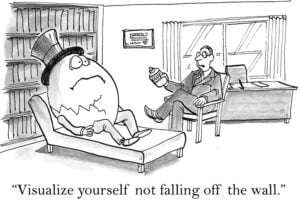Recently, I had lunch with a psychiatry colleague who…
is setting up a new group practice near Lake Union. We spent about an hour discussing treatment approaches and practice philosophy. He is an academic psychiatrist who has published research on improving the quality of treatment for mental health in primary care. It was a productive meeting, and as many of my patients know, I am constantly seeking out the best specialty talent for our practice, so I happily paid for lunch. Although, one week later I did get a bill from him for $180.
Actually, he e-mailed me and said, “I’ve never met a primary care doc who knew so much about psychotherapy.” But, fact is, it’s a sad sack of affairs in primary care when it comes to mental health. These issues represent about one-third of the workload of a typical primary care doctor, and we provide more than half of all the mental health care in the country. To state the obvious, as primary care physicians, our expertise should be deep in the common problems that walk through the door, but this is one area in which many docs are lacking.
The main reason why mental health remains the ugly stepchild in primary care is money. These visits take a long time and physicians outside of the concierge model who provide a lot of good, solid mental health care had better marry a plastic surgeon or they will wind up in bankruptcy. I actually believe that most primary care doctors would gladly do much more for their patients with mental health issues if these problems came with better insurance payments. Most primary care doctors have good people skills. Providing solid in-office psychotherapy and medication management simply requires mastering a knowledge base which is well within the capabilities of many of these clinicians, and there is research, including that of my colleague at lunch, supporting this notion.
Indeed, if you Google “mental health in primary care,” you’ll be treated to article after article on the problem. Would you believe there is an entire journal devoted to publishing research on the challenges of providing mental health treatment in primary care? There are also at least a dozen professional societies out there with 30-page position papers and they all say pretty much the same thing: primary care docs should be better at diagnosing and treating mental health issues, even if they have to offload some of the work to non-physician providers. In the real world outside of position papers and policy statements, I don’t think things are going to change much because of economics.

Actually, my skills are mainly in cognitive and behavioral psychotherapy. Honestly, these are the approaches which are most beneficial in primary care, and most likely to be of help for the common problems that walk in my door.
Cognitive therapy says you are depressed because of what you are thinking. The goal is to force you to challenge the thoughts in your head which are illogical or don’t hold up to scrutiny. (“I’m worthless.” “No one will ever love me.” “I must be perfect at my job or I will be fired.”) Behavioral therapy says you are depressed or anxious because of what you are doing; lying around all day watching TV, avoiding elevators, not working or being productive. It is poor life management which is causing unhappiness. Behavioral methods try to get folks activated, working, engaged, and to stop avoiding problems that should be tackled head-on. Neither of these approaches focus too much energy on your childhood or early life experiences, in contrast to what you commonly see on TV and in the movies.
Another advantage is that these methods tend to tackle very specific issues and problems. The laypersons’ view of a great therapist is someone who formulates a grand insight deep into your character and ties it all together, kind of like a poet or a Bob Dylan song. Although this may help a minority of patients, most are better off just working very specifically on fixing what is bothering them and keeping the deep insights to a minimum. One of my favorite approaches in this regard is a cognitive and behavioral approach called CBASP, pronounced “see-basp,” that focuses on a moment in time when you had a bad interaction with another person. Although a CBASP-type approach might require spending an hour on a five-minute encounter with someone, it often yields great rewards, and the deep insights sometimes come tumbling out on their own anyway.
Life coaching has become another popular
After 10 years in the concierge business, most of my coaching tends to be with executives and professional types who are having challenges in the work environment. A great coach brings his or her own life experience to the table. In fact, most primary care physicians have seen an extraordinary variety of life situations and can use that base of experience as a worthwhile platform for coaching.
Great psychotherapy often includes a
coaching element and great coaching
includes a lot of psychotherapy.
I’m fortunate to have a great group of clinical psychologists and psychiatrists that I work with. Some patients prefer to see me, but others are best off being treated directly by one of these professionals, and I am always happy to assist with a referral. Our main challenge is that there is a huge degree of variation in quality when it comes to mental health providers. If you fall and break your hip, there are two dozen orthopedists at Swedish who will do a perfectly good job of fixing it. But if you can’t leave your house without checking the stove 30 times, there are only a minority of practicing therapists in Seattle who will provide the proper treatment. A second challenge is that the good therapists tend to fill their practices. When word gets out that someone is very talented, that individual becomes nearly impossible to get into. For folks who don’t have the time to work with a therapist, I have a supply of carefully selected books covering various issues. Reading a book or two can sometimes be extremely helpful.

In my dumpy building with our cheap Ikea furniture and mass produced posters on the walls, I don’t see “concierge” medicine as a mechanism for coddling rich people as some of our critics might claim. Instead, I see it as a way to provide nearly ideal primary care in the way it should be practiced. In the dreamlike fantasy world I am fortunate to inhabit, primary care physicians have the time, skill, and motivation to treat mental health problems, as well as look after high blood pressure and diabetes.

